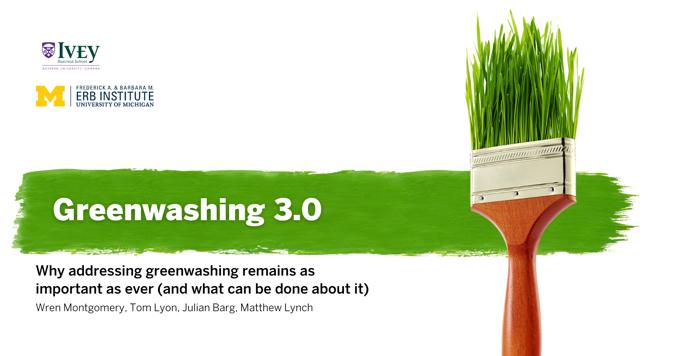The recruiter smiles, the candidate nods, and the interview begins. On the surface, everything clicks: a polished résumé, thoughtful questions, and easy rapport. But beneath the surface, the decision is already made. Before stepping into the room, the candidate had reviewed the company’s sustainability statements, weighed their glossy green claims against watchdog headlines, and spotted the cracks. They arrived knowing one thing: this isn’t where they’ll work.
This is the hidden cost of greenwashing – a term coined in 1986 to describe the practice of appearing environmentally responsible without meaningful action. Once brushed off as clever marketing, greenwashing now brings steep consequences: environmental, regulatory, reputational, and, as new research from Wren Montgomery, Ivey Associate Professor of Sustainability and General Management, makes clear, talent related.
Walking the talk – or just talking?
Fifty years ago, most jobseekers prioritized roles based on salary, opportunity, and job security. Today, the calculus is shifting. Increasingly, candidates – especially younger talent – want their careers to align with something less tangible but far more powerful: their personal values. Nowhere is this more evident, perhaps, than in expectations around sustainability and social responsibility.
“Today’s talent market is innately aware of what happens when leaders chase the bottom line at the expense of everything else,” said Montgomery. “They want to work for companies that prioritize responsibility and integrity.”
For organizations, this raises a critical question: what happens when a company talks the talk but doesn’t walk the walk, especially when it comes to environmental responsibility? And what does that gap between words and actions mean for the jobseekers?
That’s exactly what Montgomery and her Western University collaborators – Jennifer L. Robertson, Talib Karamally, and Bonnie Simpson – set out to explore. They asked 261 real jobseekers to browse a mock company website, accompanied by a third-party report that either confirmed, contradicted, or didn’t address the company’s environmental claims. Their aim was to understand how the alignment, or misalignment, between words and actions shapes candidates’ opinion and interest in the company.
The high cost of hollow claims
The results were telling. Jobseekers aren’t just skimming corporate sustainability claims – they’re actively scrutinizing them. “And when those claims prove credible, they reward the company. When they don’t, they push back,” said Robertson, lead author of the study.
In fact, when claims held up under scrutiny, the payoff was clear. Backed by credible evidence, sustainability messages made companies appear more trustworthy, more attractive, and more worthy of a candidate’s time.
But when the claims failed, when greenwashing was exposed, the effect flipped. Jobseekers grew cynical, questioning the company’s integrity and ultimately losing interest in working there. This “cynicism effect” was especially pronounced among candidates with a high need for cognition – those who naturally analyze information more deeply.
“Greenwashing is never a smart strategy for any business,” said Montgomery. “But if your company relies on people who question, research, and innovate, be especially mindful – these deep and critical thinkers are more attuned to inconsistencies.”
And for companies that say nothing at all? The research shows silence isn’t inspiring, but it’s less risky. Without bold claims to scrutinize, jobseekers didn’t show the same excitement. But neither did they turn cynical.
Building sustainability credibility, sustainably
These findings might tempt some companies to pull back on sustainability statements altogether. But Montgomery, Robertson, and their team emphasize that the lesson isn’t to retreat, it’s to do better. To help organizations communicate authentically about sustainability – and strengthen their appeal to talent – the researchers offer three steps:
1. Ground your green claims
Be specific. Only make environmental claims you can back it with credible data, independent verification, or third-party certification. Steer clear of vague, sweeping statements – like “we are sustainable” – that can’t be substantiated.
2. Map it, measure it, report it
Lay out a transparent plan for improvement with clear steps and precise metrics. Then, report openly on your progress so stakeholders see both accountability and follow-through.
3. When in doubt, keep it simple
For companies still developing their green strategy, silence can be the safer path. It may not win over the most environmentally conscious jobseekers, but it avoids the greater risk of appearing inauthentic or cynical.
“There’s no doubt greenwashing has become rampant in business and is fueling the climate crisis,” said Montgomery. “By communicating honestly about their sustainability goals and progress, companies can not only attract strong talent but also set a precedent for a greener future. That’s a win–win.”
To learn more about why sustainability talk can make or break your talent strategy, read Robertson, Montgomery, and colleagues’ research, Understanding the Effects of Corporate Environmental Communication on Jobseekers, in Business Strategy and the Environment.









